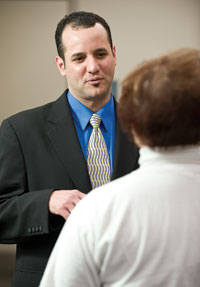Taking a fresh look at employee recruiting
The story behind the improbable journey of Adin Palau and his family from Havana, Cuba, to Madison eight years ago is a testament to how persistence, luck, hard work, community involvement and good advice can change lives forever.
Palau was a winner of the 2000 Cuban lottery, a U.S. State Department special migration program that allows several thousand Cubans to migrate to the United States every two years. Literally millions of Cubans apply for this program.

Adin Palau, a training officer for the Office of Human Resources, speaks with a colleague. Since beginning in his new position as a campuswide recruiting manager earlier this year, Palau has been working to increase UW–Madison’s profile with potential employees by developing databases, working with national organizations and assessing the effectiveness of his office’s current practices.
Photo: Bryce Richter
After being discouraged by previous failed attempts, Palau was randomly selected to participate, met all the requirements and impressed during his interview. Soon Palau, his wife and two children were preparing for a new life in the states.
But there was another bit of luck involved — a chance meeting in Havana with a Madison native — that steered the family toward the snowy Midwest.
Palau admits that Miami — not Madison — was the first place that came to mind for relocation. “But she convinced us we should give Madison a try, that professionally it was going to be fantastic for us.”
Despite being greeted by chest-high snowbanks at the Dane County Regional Airport, the Palau family planted roots and thrived in Madison. Since 2000, Palau has been a training officer for the UW–Madison Office of Human Resources, focusing on community outreach efforts that can bring greater diversity to classified and academic staff applicant pools.
Beginning this year, Palau has stepped into a new position as campuswide recruitment manager, which will allow him to build centralized recruitment strategies for all categories of employment at UW–Madison, including faculty, academic staff and classified staff.
Without question, Palau’s personal story of how he ended up in Madison informs his philosophy about recruitment: that beyond good policies and aggressive tactics, word-of-mouth can play a huge role in landing top talent.
“Every person who is connected to the university, who goes out to a conference, teaches a class or interacts with national colleagues, is a potential ambassador for the campus,” say Palau. “My priority is to give UW–Madison’s ambassadors the right tools and information to share the message that UW–Madison is an employer of choice.”
With recruiting and hiring a highly decentralized affair at UW–Madison, Palau’s challenge is to develop shared resources that will give hiring managers an array of strategies that will lead to greater talent and diversity in their pools.
“There is no one magic formula that applies to all,” he says.
For example, Palau will be looking at increasing connections with professional associations as a way to get the word out about hiring. He is also looking at high-impact national conferences, such as those of the Urban League or NAACP, as places where UW–Madison should have a recruiting presence. Palau also is assembling a database of the top 100 schools and colleges nationwide that are big producers of bachelor’s and graduate degree-holders from underrepresented groups, such as African Americans and Hispanics.
Based on the dramatically different ways in which Generation Y gets information, Palau will also be exploring greater Web-based recruiting strategies, including ways to tap Facebook, MySpace, YouTube and other media. Palau notes that, in a recent interview at the Division of Information Technology (DoIT), human resources staff regarded their current hiring as “fantastic,” primarily because they are getting good returns from advertising on Facebook.
Palau’s ultimate goal is to pull all of these disparate resources together into a comprehensive tool that will serve as a resource to assist Human Resources staff and hiring managers in recruiting the best-qualified candidates for their positions. It will include updated information on the best publications to advertise in to reach different audiences, as well as regional and national electronic job posting services.
Palau says he is in the process of assessing the effectiveness of the current Office of Human Resources Web presence. While it contains a great deal of information, Palau says one goal is to develop a stronger brand presence on the site and communicate more of the great intangible benefits that come from working in the UW–Madison community.
Another interesting recruitment market is what’s known as a “passive job-seeker,” says Palau. These are not people actively pounding the pavement in search of a job, but would consider a new opportunity if the right one came along. This segment of an applicant pool can really enhance the talent level, so Palau will be looking at more strategies to get open jobs in front of this group.
Bigger, better and more diverse applicant pools are an obvious goal of Palau’s job. But he also wants to promote ways of making all applicants — whether they get the job or not — feel like they had a positive experience with UW–Madison.
Palau is a 1997 graduate of the Havana Polytechnic Institute and speaks four different languages: Spanish, English, Italian and French. He is a former member of the board of directors of the Urban League of Greater Madison. Currently he is on the board of directors of Centro Hispano of Dane County and also serves on the executive committee of the UW–Madison Latino Faculty and Staff Association.
Tags: diversity
